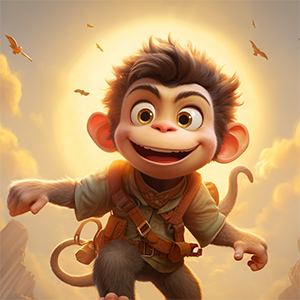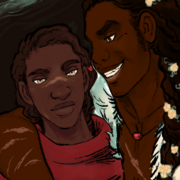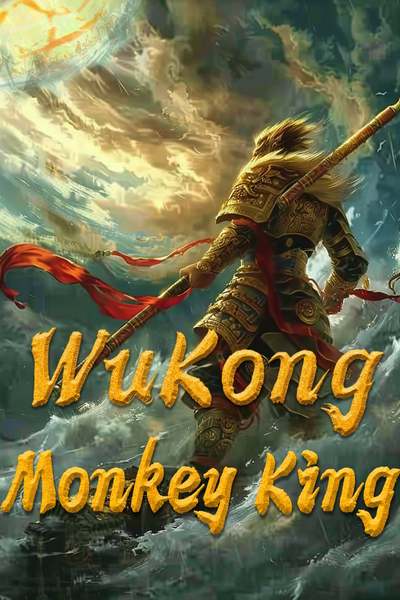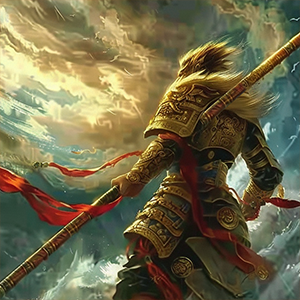On this day, Ruyi came to seek Wukong again, instructing him to hoe the garden and catch insects. In the past, Wukong would have gone without hesitation, but at this moment, he sat upright on the couch and asked with a profound smile, "Brother Ruyi, why must we hoe the weeds?"
Ruyi was taken aback, "Weeds must be removed to not hinder the growth of the flowers. Why even ask?"
Wukong countered, "Why not remove the flowers and let the weeds grow strong and beautiful?"
Ruyi looked puzzled, "Who would remove the flowers? That's absurd! If you're just being lazy, I'll ask someone else."
Wukong got up from the couch, bowed, and said, "It's not laziness, I truly don't understand. Please, don't be offended. I'll go now, I'll go now."
Another day, a Daoist boy of the same generation named Ruzhen came to assign tasks to Wukong and saw him fiddling with a strangely shaped vessel on the table. The vessel was bowl-shaped but tilted, appearing as though it would spill water if filled.
Ruzhen asked, puzzled, "This thing can't hold water. What's it for?"
Wukong smiled, "You say it can't, so why not give it a try?"
He grabbed a water jug and poured water into the vessel. As the water flowed, the vessel gradually straightened. Ruzhen was surprised and said, "So, it stands straight when filled with water."
Wukong responded, "Not necessarily." He continued pouring until the vessel was nearly full, then suddenly, it tipped over, spilling all the water.
Ruzhen couldn't dodge in time and got his clothes wet, scolding, "You knew it would spill, why fill it?"
Wukong blinked and said, "You should have known, what is full must spill. What's the point of being full if not to lose some?"
Ruzhen huffed and stormed out of the room, shouting, "It's time to hoe the garden and prune the trees!"
Ruzhen hurried back to the main hall, where the Patriarch was meditating. Sensing Ruzhen's displeasure, the Patriarch asked, "Ruzhen, do you understand the meaning of neither joy nor sorrow, neither anger nor annoyance?"
Ruzhen respectfully replied, "I do."
"Then why are you upset?"
Ruzhen hesitated, and the Patriarch scolded, "A child hard to teach!"
Ruzhen kneeled and said, "It's all that monkey's fault." He explained how Wukong tricked him with the vessel, which stood straight when filled with water but spilled on him when overly full, seemingly on purpose.
The Patriarch said, "That's quite clever, no need to fuss over such trivial matters."
Ruzhen added, "That monkey also mocked me, saying 'What's the point of being full if not to lose some?'"
The Patriarch initially dismissed it, but upon hearing "What's the point of being full if not to lose some?" he repeated it to himself, finding deep meaning. Pleased, he dismissed Ruzhen.
The Patriarch thought, indeed, fate nurtures wisdom. However, the monkey's nature is unstable. After refining it for a few more months, it will be time to teach him the boundless Dao.
Wukong had been engaging in mysterious actions and speaking profound but enigmatic words, puzzling the other disciples. Initially, they complained to the Patriarch, but over time, they thought Wukong had gone mad and ignored him, leaving him with no duties, which bored him immensely.
Unbeknownst to Wukong, the Patriarch was aware of his burgeoning wisdom and was tempering his monkey nature. Wukong continued to seek extraordinary ideas daily, but the more he did, the further he strayed from understanding.
One night, unable to sleep, Wukong lay under a millennium-old cypress tree in the courtyard, gazing at the stars. The stars, bright even without the moon, seemed within reach, different from his previous life.
Having been in this world for over a year and experiencing unexpected twists, Wukong had fully "entered the role" and sensed that his presence might change the Journey to the West. Whether this change would be significant remained unknown, but at least he had become a disciple seven or eight years earlier than the original Monkey King. Who knew what the future held?
Contemplating the stars, Wukong wondered if they were part of this world and if great beings like Laojun and the Buddha could traverse the cosmos. Once he learned the cloud somersault, he resolved to try, lest he regret it for life.
Thinking of the cloud somersault, Wukong sighed: Patriarch, what are you waiting for? They say there's no question that can't be answered, but the hardest questions are those without form. How could he solve the riddle of the Patriarch's intentions without forcing himself into a risky move?
Thinking of the cloud somersault, Wukong couldn't help but sigh, "Oh Patriarch, what exactly are you waiting for? As the saying goes, there's no problem that can't be solved; the hardest problem is one without a question. If I can't fathom the Patriarch's intentions, how can I solve the puzzle? Do I have to force myself to take a risky move?"
Three days later, Ruyi was in the backyard discussing scriptures and the Dao with his fellow disciples when he saw Wukong step in from the corridor. Ruyi was surprised; Wukong usually stayed in the front yard and had never gone elsewhere. Today's visit was unexpected.
Knowing Wukong had been acting strangely lately, everyone quietly avoided him, fearing he would cause some bizarre situation. However, Wukong simply found a corner to sit quietly and listen to the discussions without uttering a word. After listening for a while, Wukong was secretly shocked to find that, although these disciples wore Taoist robes just like Patriarch Subhuti, they mostly discussed Buddhist Pure Land, a topic of Buddhism. Could it be that Patriarch Subhuti was actually from the Western world?
At that moment, a wise elder brother was answering questions. A young Daoist boy asked, "Elder Brother Huineng, among the many Taoist scriptures, which should we study?" Many nodded in agreement with the question.
Huineng nodded slightly and after everyone quieted down, he said, "The Śūraṅgama Sūtra once said, 'The source nature is not dual; expedient means have many doors.' If you ask which scripture to read, the Nichiren sect teaches to chant only the five words of the 'Wonderful Dharma Lotus Sutra'; followers of Pure Land Buddhism chant 'Namo Amitabha Buddha,' and in our sect, there is only one word..."
As Huineng said this, everyone was astounded. To attain the Dao, one need not study countless scriptures but only understand one word.
A young Daoist boy eagerly asked, "Elder brother, what is that word?"
Huineng continued, "That word is—"
"Empty!" The one who spoke was none other than Sun Wukong, who had been silent until now.
The crowd was shocked.
Ruyi quickly pulled Wukong aside, "Stop talking nonsense! Let's listen to the elder brother's profound insight."
Wukong smiled slightly and said no more, thinking to see what profound insight he had.
Huineng's face turned sour, as he was about to reveal "empty" himself, but Wukong had beaten him to it. As an elder brother of the Huineng generation, he had his uniqueness. Huineng flicked his sleeve with his left hand and pinched his right finger lightly, saying, "That word is the character for 'nothingness.'"
Wukong chuckled, amused by Huineng's quick response; the flick of his finger seemed like he was searching for prayer beads.
Huineng, sensing the mockery in Wukong's laughter, asked aloud, "Wukong, do you have any profound insights?"
Wukong was waiting for this moment. He stood up and said, "I dare not claim to have profound insights. Just last night, I had a strange dream where a Buddha, sixteen feet tall, taught me that all transformations come from one word, 'empty.' Today, hearing the elder brother speak, I couldn't help but blurt it out. Please forgive me."
When Wukong mentioned "a Buddha, sixteen feet tall," he carefully observed everyone's expressions. The younger Daoist boys looked utterly confused, while the elder brothers of the Huineng and Zhineng generations appeared shocked, showing disbelief.
Huineng forced a calm demeanor and laughed dryly, "What the junior brother said makes sense. We should seek the Patriarch's guidance for a definitive conclusion." Without saying goodbye, he hurried out. Soon after, all the Daoist boys filed out, with Ruyi looking back at Wukong in confusion before leaving as well. The vast backyard was left with only Wukong.
"Seeking the Patriarch's guidance" was probably a euphemism for going to report, Wukong thought. Judging by the Daoist boys' reactions, they undoubtedly recognized the Buddha, and in this world, the only Buddha with a sixteen-foot golden body could be the Buddha himself. This move was like "shaking the mountain to scare the tiger." Even if Patriarch Subhuti had great skills, he couldn't find Wukong's true origin. Wukong chuckled to himself, curious about how the Patriarch would respond.
Annotations:
Daoist apprentice (道童): A novice practitioner or student under the guidance of a Daoist master, often involved in both spiritual practices and mundane tasks within a Daoist temple or sect.
Shurangama Sutra(楞严经): An important Mahayana Buddhist scripture that discusses the fundamentals of meditation and enlightenment.
Lotus Sutra(妙法莲华经): One of the most influential texts in Mahayana Buddhism, known for its profound teachings on the true nature of reality and the Buddha nature inherent in all beings.
Namo Amitabha Buddha (南无阿弥陀佛): A phrase used in Pure Land Buddhism invoking the name of Amitabha Buddha, believed to aid in rebirth in the Pure Land, a place of bliss and teaching.
Emptiness (空): A central concept in Buddhism, especially in the Mahayana tradition, signifying the absence of inherent existence in all phenomena, leading to a deeper understanding of reality and liberation from suffering.
Knocking the Mountain to Shock the Tiger (敲山震虎): A Chinese idiom meaning to use a show of strength or a warning to intimidate one's opponents indirectly.











Comments (0)
See all